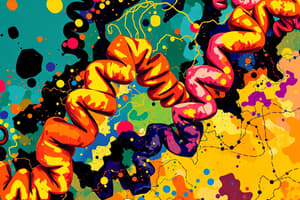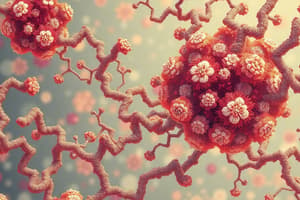Podcast
Questions and Answers
What determines the unique three-dimensional structure of a protein?
What determines the unique three-dimensional structure of a protein?
- Tertiary structure
- Quaternary structure
- Secondary structure
- Primary structure (correct)
Which level of protein structure involves the folding of a protein into a unique three-dimensional shape?
Which level of protein structure involves the folding of a protein into a unique three-dimensional shape?
- Quaternary structure
- Tertiary structure (correct)
- Secondary structure
- Primary structure
What are proteins made up of?
What are proteins made up of?
- Chains of amino acids (correct)
- Chains of fatty acids
- Chains of nucleic acids
- Chains of carbohydrates
Which level of protein structure involves the interaction of multiple protein subunits to form a functional protein complex?
Which level of protein structure involves the interaction of multiple protein subunits to form a functional protein complex?
In biochemistry, which area focuses on the interactions between atoms, molecules, and ions within and between living organisms?
In biochemistry, which area focuses on the interactions between atoms, molecules, and ions within and between living organisms?
What are the secondary structures that proteins can fold into?
What are the secondary structures that proteins can fold into?
What is the primary function of protein enzymes?
What is the primary function of protein enzymes?
How are changes in the DNA sequence related to protein structure and function?
How are changes in the DNA sequence related to protein structure and function?
What is the role of proteins in immunity?
What is the role of proteins in immunity?
How do genetic mutations relate to diseases and syndromes?
How do genetic mutations relate to diseases and syndromes?
What provides the foundation for understanding the chemical processes within and between living organisms?
What provides the foundation for understanding the chemical processes within and between living organisms?
What do researchers gain insights into by studying the interactions between proteins and their roles in various biological processes?
What do researchers gain insights into by studying the interactions between proteins and their roles in various biological processes?
Flashcards are hidden until you start studying
Study Notes
Introduction to Biochemistry: Protein Structure and Function
Biochemistry is the study of the chemical processes within and between living organisms, focusing on the interactions between atoms, molecules, and ions. One of the key areas of interest in biochemistry is the structure and function of proteins, which are large biomolecules that play crucial roles in various biological processes. In this article, we will explore the importance of protein structure and function in the context of biochemistry.
Protein Structure
Proteins are made up of chains of amino acids, which are linked together by peptide bonds. The sequence of amino acids in a protein determines its unique three-dimensional structure, which in turn influences the protein's function within the cell. There are four levels of protein structure:
- Primary structure: This level consists of the amino acid sequence of a protein.
- Secondary structure: In this level, proteins fold into secondary structures such as alpha helices, beta sheets, and loops.
- Tertiary structure: The tertiary structure refers to the folding of a protein into a unique three-dimensional shape.
- Quaternary structure: This level involves the interaction of multiple protein subunits to form a functional protein complex.
Protein Function
Proteins serve various functions within cells, including:
- Catalysis: Protein enzymes speed up chemical reactions, allowing life to occur.
- Storage and transport: Proteins store and transport essential products, such as nutrients.
- Regulation: Proteins act as receptors, reagents, carriers, and hormones, regulating various biological processes.
- Immunity: Proteins play a crucial role in the immune system, recognizing and fighting off pathogens.
Protein Structure and Genetics
The sequence of amino acids in a protein is determined by the genes in our DNA. Changes in the DNA sequence can lead to changes in the amino acid sequence, which in turn can alter the protein's structure and function. Understanding the relationship between genes, proteins, and their functions is essential for understanding how genetic mutations can lead to diseases and syndromes.
Conclusion
Protein structure and function are essential aspects of biochemistry, as they provide the foundation for understanding the chemical processes within and between living organisms. By studying the interactions between proteins and their roles in various biological processes, researchers can gain insights into the mechanisms of life and develop new treatments for diseases.
Studying That Suits You
Use AI to generate personalized quizzes and flashcards to suit your learning preferences.




